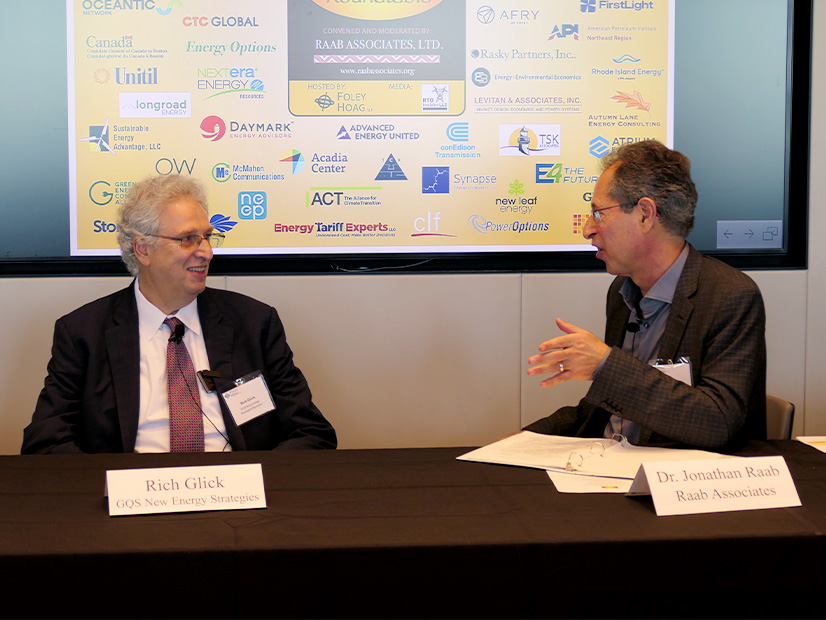
BOSTON — Energy experts from across the Northeast gathered for Raab Associates’ New England Electricity Restructuring Roundtable on Dec. 13 for a preview of some of the key issues that will dominate policy discussions in the coming year.
While 2024 brought notable success on state-level climate policy in Massachusetts, the new year brings significant uncertainty regarding whether the change in federal administration will slow the momentum of the clean energy transition in the region. (See Mass. Clean Energy Permitting, Gas Reform Bill Back on Track.)
Prior to the passage of a major omnibus climate bill in November, “the first thing on the list of challenges was siting and permitting,” said Rebecca Tepper, secretary of the Massachusetts Executive Office of Energy and Environmental Affairs.
The new climate law creates a streamlined siting and permitting process for clean energy infrastructure, capping the state’s review of permitting applications to 15 months for large projects. Tepper said collaboration between a wide range of stakeholders through the state’s Commission on Energy Infrastructure Siting and Permitting was essential to passing the bill with widespread support.
Looking forward, Tepper said the state’s “big challenge for [2025] is interconnection; you’re going to see us really focusing on that next year.”
Tepper also highlighted the possibility of another offshore wind procurement in 2025 and said the state is exploring the potential of new interregional transmission links with New York, PJM or Québec. “We see a lot of opportunity for further hydro coming from Canada,” she said.
Serge Abergel, COO of Hydro-Québec Energy Services, said increased transmission capacity between New England and Québec could help speed up decarbonization and reduce the need to overbuild renewables as the Northeastern U.S. achieves a highly decarbonized system. (See Québec, New England See Shifting Role for Canadian Hydropower.)
He said Hydro-Québec’s modeling indicates that an additional export-neutral transmission line between the regions could provide major benefits by 2040. A new line “could reduce the length of a major outage by about two days, and it could save [New England] $2 [billion] to $3 billion over those two days,” Abergel said.
Recent drought conditions have caused the company to reduce exports over the spot market to New England, causing some observers to question the reliability of Québec supply in the future and whether the benefits of new transmission capacity would justify the costs.
While ISO-NE’s exports to Québec have increased during the drought, imports continue to play a key reliability role on the grid: They earned $29 million in Pay-for-Performance credits during two capacity scarcity events this summer, far more than any other resource class. (See NEPOOL Markets Committee Briefs: Dec. 10, 2024.)
Abergel said there is uncertainty over the degree that climate change has influenced the current drought and said the conditions are “on par with the worst cycle we’ve seen in the past.”
“Our firm commitments are always met, but our spot market sales fluctuate,” he said, adding that the New England Clean Energy Connect transmission project — which includes a 20-year contract for Québec to send baseload power to New England — should be in service in December 2025.
Hydro-Québec’s energy supply should also receive a major boost from a new agreement between Québec and Newfoundland and Labrador, which was announced the day before the roundtable. The agreement would increase the price Québec pays for power from the Churchill Falls hydroelectric generating station in Labrador while paving the way for a significant increase in generation capacity.
FERC Preview
Former FERC Chair Richard Glick, now a principal at GQS New Energy Strategies, previewed what the new year could bring for the commission.
As states work to decarbonize their power supply, Glick said the incoming Trump administration “will have an impact, but maybe not as much of an impact as some fear,” adding that he is “still very bullish on what’s going on in the clean energy side.”
He also praised FERC’s work on Order 1920-A, calling it “a very helpful order” that should increase the likelihood of successful transmission projects.
Regarding Order 2023, which overhauled FERC’s interconnection rules, Glick said the commission likely “didn’t go far enough” and noted that it has taken “a really long time to act on the compliance filings.” (See New England Clean Energy Developers Struggle with Order 2023 Uncertainty.)
Under a Republican-led commission, grid operators may be afforded greater flexibility on both orders, Glick said. He added that, under the Trump administration, FERC could look more favorably at pipeline expansion projects and proposals to allow fossil generators to skip ahead in the interconnection queue for reliability purposes.
Electric Vehicle Outlook
The roundtable also featured a panel focused on transportation decarbonization, with speakers discussing the growth of the U.S. electric vehicle industry and the potential of managed charging.
Roger Kranenburg, vice president of energy strategy and policy for Eversource Energy, said he remains optimistic about the overall upward trend of EV sales despite recent growth challenges and a less favorable stance from the incoming administration. He emphasized the major role that fleet-level electrification will play in transportation decarbonization.
“Fleets are coming, and they’re going to transition faster” than individual consumers, Kranenburg said. “It’s all an economic decision.”
Chris Rauscher, head of grid services and virtual power plants at Sunrun, highlighted the potential of EVs to help eliminate peak demand costs and emissions.
There currently is “way more capacity in electric vehicles than there is in stationary storage in the U.S.,” Rauscher said, adding that, when modeling 200,000 bidirectional EVs on the New England power system, just 30% of the vehicles’ battery capacity would eliminate the need for oil peakers on a winter day.




